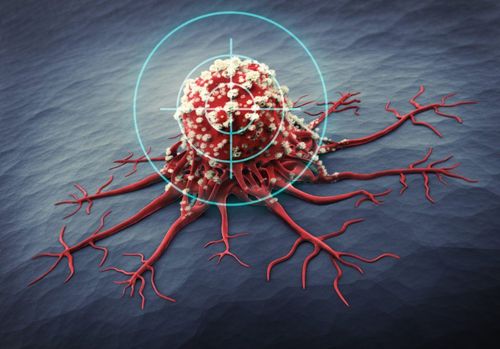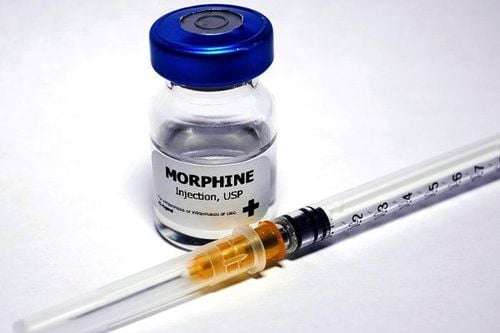This is an automatically translated article.
Targeted therapy is a cancer treatment that uses drugs to target specific genes and proteins involved in cancer cell growth and survival. Targeted therapy can affect the tissue environment that helps the cancer grow and survive, or it can target cells involved in cancer growth, such as blood vessel cells. Doctors often use targeted therapy along with chemotherapy and other cancer treatments.
1. What is targeted therapy?
Targeted therapy is a cancer treatment that uses drugs designed to "target" cancer cells without affecting normal cells.
The genes of cancer cells often have changes that make these cells different from normal cells. Genes are the part of a cell's DNA that determines the cell's structure and function. When a cell has certain genetic changes, it doesn't behave like a normal cell. For example, genetic changes in cancer cells can allow cells to grow and divide very quickly. These types of changes are what causes it to become cancerous.
But there are different types of cancer and not all cancer cells are the same. For example, colon and breast cancer cells have different genetic changes that help them grow and/or spread to other organs. Even between different people with the same common cancer (such as colon cancer), cancer cells can have different genetic changes that make a particular type of colon cancer other than that of others.
The researchers also found that the environments in which different cancers start and develop are not always the same. For example, some cancers have certain proteins or enzymes that send certain messages to let the cancer cell grow and copy itself.
From understanding these characteristics of cancer cells, scientists have developed drugs that can "target" these proteins or enzymes and block the messages being sent. Targeted drugs can block or turn off the signal that makes cancer cells grow, or can signal cancer cells to kill themselves.
Targeted therapy is an important cancer treatment, and researchers will develop more targeted drugs as they learn more about specific changes in cancer cells. To date, only certain types of cancer have been treated using these drugs. Most targeted therapies also require a combination of surgery, chemotherapy, or radiation therapy.
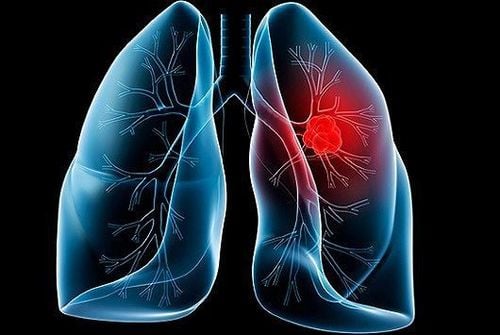
2. How is targeted therapy different from chemotherapy?
Targeted drugs like other drugs used to treat cancer are called chemotherapy. But targeted drugs don't work the same way as regular chemotherapy (chemotherapy) drugs. Targeted drugs do not work on some of the changes that make cancer cells different from normal cells. This makes them work differently from conventional chemotherapy drugs.
Targeted drugs work in two main ways:
Because of their intended effect, these drugs act on cancer cells and leave mostly normal healthy cells alone. . Traditional chemotherapy is cytotoxic to most cells, which means it can damage normal, healthy cells in addition to damaging and killing cancer cells. Targeted drugs usually work by stopping cancer cells from replicating themselves. This means they can help prevent cancer cells from dividing and making new cancer cells. While the traditional method of chemotherapy destroys the cancer cells that have been generated.
Trắc nghiệm: Thử hiểu biết của bạn về bệnh ung thư
Ung thư là nguyên nhân gây tử vong hàng thứ 2 trên thế giới. Thử sức cùng bài trắc nghiệm sau đây sẽ giúp bạn có thêm kiến thức về yếu tố nguy cơ cũng như cách phòng ngừa bệnh ung thư.
Bài dịch từ: webmd.com
3. How Targeted Therapy Works
Targeted therapies are designed to find and attack specific areas or substances in cancer cells, or can detect and block certain types of messages sent inside cancer cells to protect it develops. Certain substances in cancer cells become "targets" of targeted therapies:
A certain protein is found in excessive amounts in cancer cells; A protein present on cancer cells that is absent from normal cells; A protein that is mutated (altered) in some way on a cancer cell; These gene (DNA) changes are not present in normal cells. Targeted drugs can work to:
Block or turn off the chemical signals that tell cancer cells to grow and divide; Altering proteins in cancer cells to cause cells to die; Stop creating new blood vessels to feed cancer cells; Activate the patient's immune system to destroy cancer cells; Brings toxins to cancer cells to destroy them, but not normal cells. The effects of some drugs can affect where these drugs work and the side effects they cause.
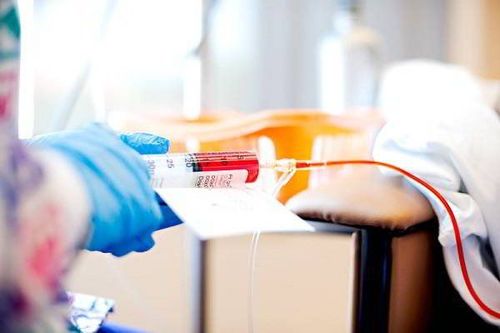
4. Targeted Therapy as a Precision Medicine
Targeted therapy is sometimes called precision medicine or personalized medicine. This is because they are designed to precisely target specific changes or substances in cancer cells, and these targets can be different even if everyone has the same type of cancer. .
Certain types of tumors are screened for different targets after a biopsy or surgery, and this can help find the most effective treatment. Finding a specific target makes patients more suited to more precise or personalized treatment.
Some targeted drugs are designed to be more “targeted” than others. Targeted therapies are classified as small or large molecule drugs.
Small molecule drugs: These drugs are small enough to get into cancer cells when they find it. They work by targeting a specific substance inside the cell and blocking it; Large-molecule drugs: These drugs are often not suitable to attack inside cancer cells. They work by weakening or destroying proteins or enzymes on the surface of cells. They are often described as a “lock and key” because the key molecule that opens the locks are enzymes or proteins on the cell surface. The key fits into the lock, allowing the potion to work.
5. Types of targeted therapy
Many types of cancer can be treated with targeted therapies, and there are different types of targeted therapies. Below are some types of targeted treatments along with a few examples of how they are used.
Angioplasty inhibitors: These prevent the formation of new blood vessels that nourish cancer cells. For example, bevacizumab works for many different types of cancer. Monoclonal Antibodies: These antibodies can deliver molecules on their own or keep the molecules intact that enter cancer cells to kill cancer cells. For example, alemtuzumab treats some chronic leukemias, trastuzumab treats some breast cancers, cetuximab treats some colorectal, lung, head and neck cancers). NOTE: Some monoclonal antibodies are called targeted therapies because they specifically target the cancer cells they want to find, attach to, and attack. But other monoclonal antibodies work like immunotherapy because they make the immune system more responsive allowing the body to find and attack cancer cells more effectively; Certain protein inhibitors: These disrupt the normal functions of cells, so the cancer cells die. For example, bortezomib treats multiple myeloma. Signal transduction inhibitors: These disrupt cell signals so that they change the behavior of cancer cells. For example, imatinib treats some chronic leukemias. >> See more: Ingredients and uses of functional foods Fucoidan - Article by Pharmacist Nguyen Thi Thanh Hoa - Pharmacist Pharmacy - Vinmec Times City International General Hospital
6. Some cancers are treated with targeted therapy
Targeted therapy is a rapidly growing area of cancer research and researchers are working on many new targets and drugs through clinical trials. Below are a few examples of targeted therapies currently available.
Breast cancer: About 20% to 25% of breast cancers have too much of a protein called human epidermal growth factor receptor 2 (HER2). This protein makes tumor cells grow. If the cancer is "HER2 positive", there are many therapeutic options that target this; Chronic myeloid leukemia (CML): Almost all cases of chronic myeloid leukemia are caused by the formation of a gene called BCR-ABL. This gene leads to the production of an enzyme known as the BCR-ABL protein. This protein causes normal myeloid cells to start acting like cancer cells. This is the first mutation to be treated with targeted therapy; Colorectal cancer: This type of cancer often makes too much of a protein called epidermal growth factor receptor (EGFR). Medicines that block EGFR can help stop or slow the growth of colorectal cancer. Another option is a drug that blocks vascular endothelial growth factor (VEGF). Lung cancer: Drugs that block EGFR can also stop or slow the growth of lung cancer. This may be more effective if EGFR has certain mutations. There are also drugs to treat lung cancer that attack the ALK and ROS gene mutations. Doctors may also use angiogenesis inhibitors for some lung cancers. Lymphoma: In lymphoma, there is an overproduction of B lymphocytes, a type of white blood cell that fights infection. Drugs that target this enzyme that leads to cell overproduction have been very successful in treating lymphomas and some B-lymphoid leukemias. Melanoma: about half of all malignancies have mutations in the BRAF gene. Researchers know certain BRAF mutations and create drugs that target this. So there are many FDA-approved BRAF inhibitors. But these drugs can be harmful if your tumor doesn't have the BRAF mutation.
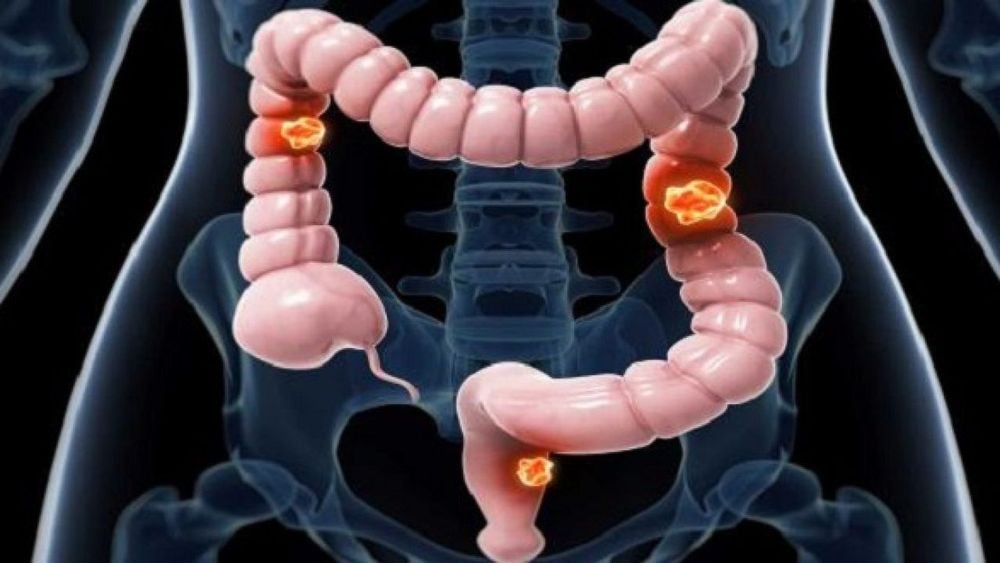
7. Are there any limitations to targeted therapy?
As with any cancer treatment, targeted therapy may not be the best treatment for everyone with cancer. Using a drug for your specific cancer may seem simple, but targeted therapy is complex and it doesn't always work. It's important to know that:
Targeted therapies won't work if the tumor doesn't have a target for that drug; Having a target for the drug to attack does not mean that the tumor will respond to the drug; Response to treatment may not last over time. The drug's target may not be as important to cancer growth as was previously thought, so the drug may not provide much benefit. Or the cells can become resistant to the targeted therapy, so the drug may work at first but no longer work.
In addition, targeted drugs can cause serious side effects. They are not usually the same as the usual chemotherapy effects. For example, people on targeted therapy often have skin, hair, nail, or eye problems. It's important to talk to your doctor about the specific side effects that may occur with each drug in your treatment plan.
Targeted therapy is an important cancer treatment. So far, however, doctors have only been able to treat some cancers with this therapy. Most people with cancer also need a combination of surgery, chemotherapy, radiation therapy, or hormone therapy.
Early cancer screening is considered a perfect measure in the timely detection and treatment of all types of cancer. Reduce the cost of treatment and especially reduce the mortality rate in patients. Vinmec International General Hospital always deploys and introduces to customers Early cancer screening at Vinmec - Peace of mind to live well to help with gene testing, imaging diagnostics, testing of biological markers to detect tumors Soon. Vinmec International General Hospital has many packages of early cancer screening.
Only one gene test can assess the risk of 16 common cancers in both men and women (lung cancer, colorectal cancer, breast cancer, pancreatic cancer, neck cancer) uterus, stomach cancer, prostate cancer,....) Early detection of early signs of cancer through imaging, endoscopy and ultrasound. The operation is simple, careful and accurate. A team of well-trained specialists, especially in oncology, are capable of handling cancer cases. With facilities, advanced and modern medical equipment and a team of doctors with deep expertise and experience. At Vinmec, the examination process becomes fast with accurate results, saving costs and time for patients.
Please dial HOTLINE for more information or register for an appointment HERE. Download MyVinmec app to make appointments faster and to manage your bookings easily.
Reference source: cancer.net,.cancer.org




